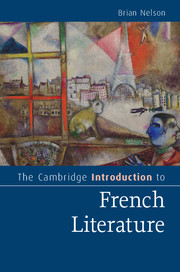Book contents
- Frontmatter
- Dedication
- Contents
- Preface
- Acknowledgements
- Chronology
- 1 Villon: a dying man
- 2 Rabelais: the uses of laughter
- 3 Montaigne: self-portrait
- 4 Corneille: heroes and kings
- 5 Racine: in the labyrinth
- 6 Molière: new forms of comedy
- 7 La Fontaine: the power of fables/fables of power
- 8 Madame de Lafayette: the birth of the modern novel
- 9 Voltaire: the case for tolerance
- 10 Rousseau: man of feeling
- 11 Diderot: the enlightened sceptic
- 12 Laclos: dangerous liaisons
- 13 Stendhal: the pursuit of happiness
- 14 Balzac: ‘All is true’
- 15 Hugo: the divine stenographer
- 16 Baudelaire: the streets of Paris
- 17 Flaubert: the narrator vanishes
- 18 Zola: the poetry of the real
- 19 Huysmans: against nature
- 20 Mallarmé: the magic of words
- 21 Rimbaud: somebody else
- 22 Proust: the self, time and art
- 23 Jarry: the art of provocation
- 24 Apollinaire: impresario of the new
- 25 Breton … Company: Surrealism
- 26 Céline: night journey
- 27 Sartre: writing in the world
- 28 Camus: a moral voice
- 29 Beckett: filling the silence
- 30 French literature into the twenty-first century
- Notes
- Further reading
- Index of authors and titles
- Index of genres, movements and concepts
- Cambridge Introductions to …
- References
12 - Laclos: dangerous liaisons
Published online by Cambridge University Press: 05 July 2015
- Frontmatter
- Dedication
- Contents
- Preface
- Acknowledgements
- Chronology
- 1 Villon: a dying man
- 2 Rabelais: the uses of laughter
- 3 Montaigne: self-portrait
- 4 Corneille: heroes and kings
- 5 Racine: in the labyrinth
- 6 Molière: new forms of comedy
- 7 La Fontaine: the power of fables/fables of power
- 8 Madame de Lafayette: the birth of the modern novel
- 9 Voltaire: the case for tolerance
- 10 Rousseau: man of feeling
- 11 Diderot: the enlightened sceptic
- 12 Laclos: dangerous liaisons
- 13 Stendhal: the pursuit of happiness
- 14 Balzac: ‘All is true’
- 15 Hugo: the divine stenographer
- 16 Baudelaire: the streets of Paris
- 17 Flaubert: the narrator vanishes
- 18 Zola: the poetry of the real
- 19 Huysmans: against nature
- 20 Mallarmé: the magic of words
- 21 Rimbaud: somebody else
- 22 Proust: the self, time and art
- 23 Jarry: the art of provocation
- 24 Apollinaire: impresario of the new
- 25 Breton … Company: Surrealism
- 26 Céline: night journey
- 27 Sartre: writing in the world
- 28 Camus: a moral voice
- 29 Beckett: filling the silence
- 30 French literature into the twenty-first century
- Notes
- Further reading
- Index of authors and titles
- Index of genres, movements and concepts
- Cambridge Introductions to …
- References
Summary
If this book burns, it burns as only ice can burn.
– BaudelaireDangerous Liaisons (Les Liaisons dangereuses), by Pierre Choderlos de Laclos (1741–1803), caused a sensation when it was published in 1782, just seven years before the French Revolution. With La Nouvelle Héloïse, it was the most successful novel of the eighteenth century. But while Rousseau's novel offered ideals that enthused its readers, Laclos's work had a much more troubled reputation. Its success was largely a succès de scandale, and in the nineteenth century it was condemned in court for immorality and officially banned. Comparing the world of La Nouvelle Héloïse with that of Les Liaisons dangereuses, and viewing the latter as a response to the former, Peter Gay writes: ‘Where Rousseau is conventional, moral, and edifying, Laclos is unconventional, immoral, and destructive. In Rousseau everybody wins through losing: the sacrifice of gratification leads to purer, more exalted happiness. In Laclos, everybody loses through winning: insistence on gratification leads to restlessness, a sense of being cheated, and tragedy.’ Although this quotation misleadingly implies that Laclos's representation of immorality is itself immoral, it evokes very well the distinctive tenor of his novel and suggests how it embodies disillusionment with the optimistic Enlightenment faith in the ability of reason alone to create human happiness.
Sexual games
Dangerous Liaisons evokes the brittle world of the French aristocracy in the final years of the Ancien Régime. It is a realm of pretence and duplicity. Written entirely in the form of letters (one of the literary conventions of the time), the novel centres on the erotic power games played by two libertines, the Marquise de Merteuil and the Vicomte de Valmont. Former lovers, they are now partners in crime. For the eighteenth-century reader, Valmont was a familiar fictional (and theatrical) type: the rake, the Don Juan. A female libertine such as Merteuil would have been a far less familiar (but more striking) figure.
- Type
- Chapter
- Information
- The Cambridge Introduction to French Literature , pp. 82 - 89Publisher: Cambridge University PressPrint publication year: 2015



